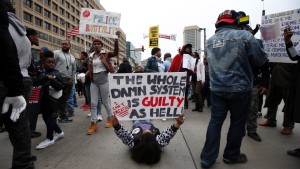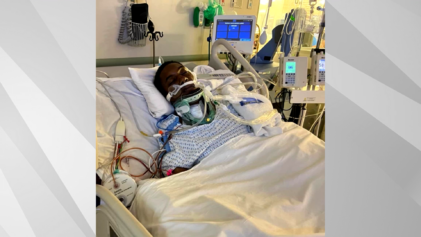Troubling details have emerged about the past of one of the Baltimore police officers involved in the death of Freddie Gray.
Lieutenant Brian Rice, who is facing charges of false imprisonment, misconduct, assault and manslaughter, has a history of “intimidation and violence,” according to his ex-wife and her new husband.
Rice was one of the officers that pursued and arrested Gray but his past has some people questioning why he was still employed at the police department to begin with.
Throughout his career in law enforcement, Rice had his weapons confiscated twice after displaying erratic behavior and threatening his ex-wife, Karyn McAleer and her husband, Andrew McAleer.
He was even hospitalized for a mental health evaluation in 2012 after he claimed he was going to shoot himself.
After mainstream media have already attempted to use Gray’s criminal history of charges related to drug possession to paint him as a person somehow deserving of the fatal injury, it will be interesting to see if this officer’s past will haunt him in the same manner as the investigation presses forward.
The officer’s troubling past is laid out in court documents filed by his ex-wife, who was so frightened by the 41-year-old’s behavior that she sought a restraining order against him to keep him away from her home and her family.
The 10-page report, filed back in January of 2013, is filled with the type of accusations that warranted a closer look into whether or not Rice was mentally stable enough to be in law enforcement.
In the document, McAleer says that Rice once forced their young son to “shoot” a picture of her and her husband that had been “taped to a piece of cardboard intended for target practice.” It did not mention what kind of weapon was used to take aim at the picture.
The document also states that Rice called his ex-wife to tell her about his plans to kill himself. She quickly called her husband to warn him to be careful as Rice was clearly emotionally unstable and liable to do something reckless.
Deputies then received an emergency call from the Carroll County sheriff’s department, The Guardian reports, before Rice was picked up and taken to the hospital. His police service weapon, along with a collection of other guns he had, were confiscated.
Many believe this should have marked the end of his place on the police force but after a short suspension, he returned to his regular duties as a cop.
The Guardian reports that he was placed on an administrative suspension again eight months after that incident and McAleer secured a week-long peace order against him.
Rice had a history of showing up at his ex-wife’s husband’s place of work as well as their family home to engage in tense confrontations that eventually left McAleer fearing for his life. McAleer said Rice showed up around 2 a.m. one night reeking of alcohol, according to court documents obtained by The Guardian.
McAleer added that he witnessed Rice taking a semi-automatic weapon out of the trunk of his car before police finally arrived to the scene. His wife later informed him that her ex-husband had every intention to kill him that night.
The document details numerous other encounters, including one where Rice threatened to run McAleer over with his car.
“This caused me to become distraught and fear my life was about to end,” he wrote in the report.
Unfortunately, Rice isn’t a unique case and the Baltimore Police Department isn’t the only police department that keeps officers on patrol despite such troubling incidents.
Statistics show that roughly 40 percent of all women in police officer families become victims of domestic abuse.

“Sociopaths are attracted to positions in which they are able to assert authority over others, so it should come as no surprise that there are higher concentrations of sociopaths within law enforcement,” The Free Thought Project reports.
What is more surprising is that police departments don’t seem to be proactive about dismissing officers who show troubling signs that could be associated with psychological issues.
In fact, the exact opposite seems to be true. Police departments have a history of trying to blatantly ignore such issues. More than three-fourths of the times that domestic abuse allegations were brought up against an officer, the allegation was not even mentioned on the officer’s evaluation.
For nearly 30 percent of the cases analyzed for a study by the Los Angeles Police Department, the officers even received promotions despite their troubling past encounters.
It’s a chilling reminder that cases like that of Freddie Gray cannot be treated as if they are rare or unique circumstances. Until the entire system is reformed, the country could be taking to the streets all over again following the death of another Freddie Gray, Michael Brown, Tamir Rice, Eric Garner or John Crawford.
That hope for reform, however, may finally come to fruition over the next few years as the Justice Department has shown more interest in investigating departments being accused of racism and police brutality.
ABC News reports that the Justice Department is considering launching an investigation into the entire Baltimore Police Department, much like the same one that exposed racist emails and severe corruption in the Ferguson Police Department.
A federal civil rights probe has already been launched regarding Gray’s death.



